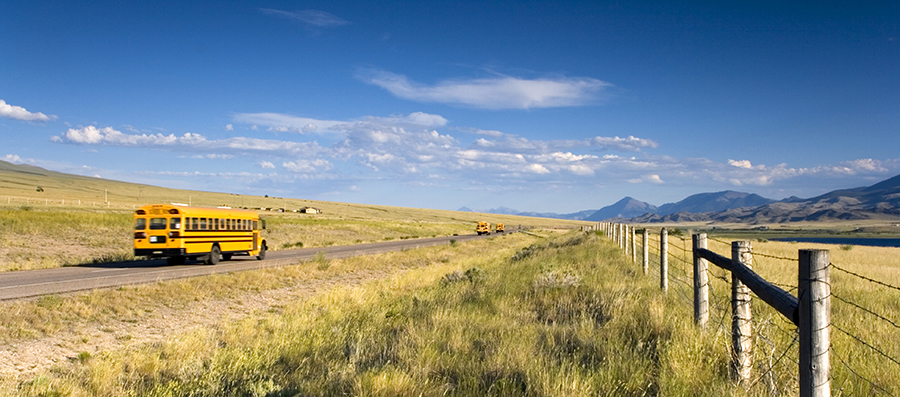Addressing Challenges and Elevating Opportunities in Rural Education

Rural school districts, educators, and students have different experiences than their urban and suburban counterparts. By their very nature, schools and districts in smaller-sized communities encounter obstacles in recruiting and retaining talent, establishing community partnerships, and facilitating students’ access to college. They also have unique, rural-specific opportunities to capitalize on tight-knit communities. Because most education research centers around urban schools, rural educators, school leaders, and policymakers are frequently underrepresented in the national dialogue around education policy.
The Regional Educational Laboratories (RELs) are designed to help fill this gap. These labs, which are funded by the Institute of Education Sciences in the U.S. Department of Education, serve as research alliances that examine and address high-priority regional needs, such as college and career readiness, educational equity, and teacher preparation and performance. AIR operates REL Midwest and REL Southwest.
College and Career Readiness
A postsecondary education is increasingly essential not only for obtaining employment but also for achieving economic stability and upward mobility. Efforts to encourage rural students to enroll in college and complete a degree must acknowledge differences rural communities face in resources and outcomes.
- Text message interventions may help reduce summer melt, in which low-income and/or first-generation students enroll in college but fail to matriculate. This project has particularly significant implications for rural students, who may have a smaller support community or network to provide these kinds of interventions in person.
- College undermatch—where students enroll at lower-quality colleges than they could get into—is a national concern. However, as this project shows, it is exacerbated in rural communities, possibly because of the greater distances required for rural students to travel to school.
- The achievement expectations of rural and nonrural students vary, but, as described in this project, their geographic location does not appear to be the primary factor in expectation-setting and achievement.
- Rural communities must establish and take advantage of different kinds of career readiness programs than those in urban or suburban regions. This REL Midwest documentary describes the unique challenges facing rural communities in Minnesota as students explore and prepare for careers:
Equity in Education
For low-income and minority students, education is the key to success and upward mobility. But evidence has shown in past decades that education has not been acting as the Great Equalizer.
- The achievement gap between black and white students in the U.S. has been the subject of considerable study, and this IES report explores how school density and demographics further affect this disparity.
- In recent years, even as dropout rates have decreased across the country, rural areas continue to face additional challenges in graduating students from high school. Many rural students suffer from declining enrollment, resulting in decreased funding, which affects the overall quality of their schools. Rural schools also tend to provide fewer offerings at the secondary level. In this video, REL Midwest and AIR experts discuss these challenges and strategies that have proven effective at countering them:
Teacher Preparedness and Performance
Teacher recruitment, retention, and performance are major concerns across the country, but they are heightened in the rural context.
- Technology has great potential to supplement classroom resources, which could be especially transformative in rural schools. A study by REL Midwest evaluated how effectively Iowa teachers have integrated technology into their classrooms.
- One major tool in recruiting, retaining, and maximizing the talent of educators is professional development. However, this report demonstrates that these opportunities are not always equally accessible in rural and nonrural contexts.
- Strong, locally designed mentoring and induction supports can help to address the unique challenges faced by rural schools related to beginning teacher development and retention. This brief outlines 10 common challenges encountered by rural schools along with strategies to address them and examples from the field.
- The Texas Comprehensive Center prepared this compilation of short summaries of Grow Your Own (GYO) teacher resources, which is organized around research questions developed by the Texas Education Agency to inform the Texas GYO teacher strategy.
- Recruiting and retaining highly qualified teachers in rural districts is a persistent struggle. This REL Midwest documentary includes research on teacher recruitment and retention across the country, and specifically in rural Michigan, and the actions that state and local education leaders are taking to recruit and retain teachers.
Additional Resources
- The Oklahoma Rural Schools Research Alliance sought to investigate three research topics: effective professional development strategies in rural schools, use of data to inform instruction in rural schools, and challenges that American Indian students face in rural schools.
- AIR has numerous resources specifically designed to support rural educators and stakeholders as they implement ESSA.
- The Rural Behavioral Health Website serves as a vehicle to support communities in addressing the behavioral health needs of children, youth, and families living in rural areas.
- The State Support Network convened communities of practice on cultivating effective rural school leaders and supporting rural school districts and published a toolkit to support rural education stakeholders in addressing problems of practice.
